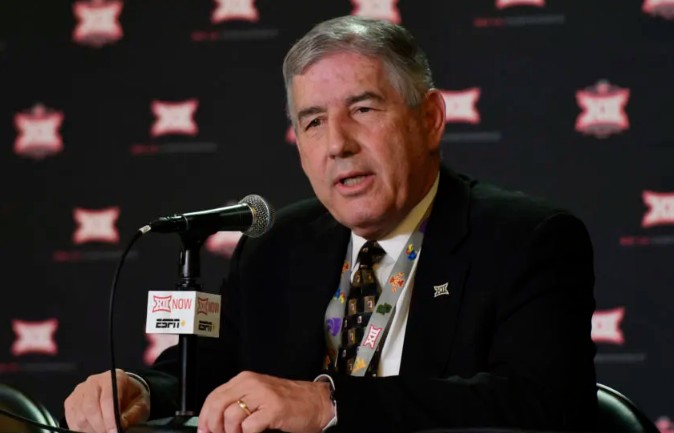Bob Bowlsby, the current commissioner of the Big 12, is stepping down later this year.
The Big 12 will have to replace longstanding commissioner Bob Bowlsby, who is stepping down later this year after ten years on the job.
Bowlsby took over the Big 12 amid a period of significant change that included conference restructuring. In a few weeks, the Big 12 lost Nebraska to the Big Ten, Colorado to the Pac-12, and Missouri and Texas A & M to the SEC.
During his tenure, the Big 12 expanded to include TCU and West Virginia, although it remained a 10-team conference. Bowlsby exits stage left as another wave of realignment approaches.
Here’s an excerpt from Bowlsby’s official announcement on his decision to stand down.
“I have reached a natural transition point in my tenure as Commissioner, as well as in my career,” Bowlsby said in a statement on Tuesday.
“After more than 40 years of serving in leadership roles in intercollegiate athletics, including the last ten with the Big 12, and given the major issues that college sports in general, and the Big 12 specifically, will address in the next several years, I have reached a natural transition point in my tenure as Commissioner, as well as in my career.”
While the Big 12 will soon lose Oklahoma and Texas to the SEC, the conference will add four new institutions in the near future, bringing the total number of Big 12 schools back to 12. These colleges are BYU, Cincinnati, Houston, and UCF.
“The Big 12 will welcome our four new members soon and will negotiate a new grant of rights and media rights agreement. I am certain that the Big 12 and our member universities are in good shape now and in the future.
As a result, this is an acceptable moment for me to stand down as Commissioner so that the next leader of the Conference may take the reins on these important issues that will arise before the conclusion of my employment agreement in 2025, laying the groundwork for the Big 12’s continued success. “
With Bowlsby’s departure, SEC commissioner Greg Sankey will be the longest-serving Power 5 commissioner, and a very influential one at that.
Bob Bowlsby, the commissioner of the Big 12, is stepping down later this year
Bowlsby’s Big 12 will be substantially different from the one his successor will lead. Despite the Big 12’s four excellent moves to include the next generation of realignment, the loss of cash cows and conference mainstays in Oklahoma and Texas is devastating. While it is unclear whether the Big 12 will retain their clout, there is a risk they may be left behind.
The good news is that three of the newcomers, BYU, Cincinnati, Houston, and UCF, have already won the Group of 5 during the College Football Playoff era.
BYU is a proud football program that won a national championship in 1984, despite not being a national independent. Despite the fact that they will not be able to compensate for the losses of Oklahoma and Texas, the Big 12 comes out on top.
What matters is that the Big 12 finds a suitable replacement for Bowlsby. His tenure as Big 12 commissioner was not always easy, but he achieved more good than harm as the conference’s president.
The round-robin, nine-game regular-season schedule was a major success, allowing the Big 12 championship game to be played for the second consecutive year. Basketball was also consistently good.
Finding a visionary who can see a good future for the Big 12 without Oklahoma and Texas is the most important aspect of Bowlsby’s replacement search.
It won’t be easy, but this new 12-team league appears to be fiercely competitive on both the football field and the basketball court. This restructured conference will benefit from playoff expansion in the long run, but things aren’t all doom and gloom for them right now.
Bowlsby’s successor will be difficult to find, but with his departure, the Big 12 has made it a high priority.





